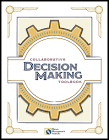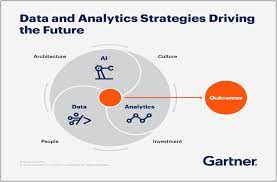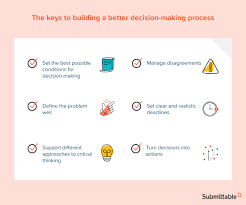Understanding Biased Decision-Making
Biased decision-making occurs when individuals make choices that are influenced by their personal beliefs, preferences, or experiences, rather than relying on objective information. These biases can lead to errors in judgment and result in suboptimal decisions.
One common type of bias is confirmation bias, where individuals seek out information that supports their existing beliefs while ignoring evidence that contradicts them. This can lead to a distorted view of reality and prevent individuals from considering all relevant factors when making decisions.
Another type of bias is anchoring bias, where individuals rely too heavily on the first piece of information they receive when making a decision. This can lead to an overemphasis on certain factors and prevent individuals from considering other relevant information.
It’s important to be aware of these biases and take steps to mitigate their impact on decision-making. One way to do this is by seeking out diverse perspectives and considering all available information before making a choice. Additionally, taking the time to reflect on your own beliefs and preferences can help you identify potential biases that may be influencing your decisions.
By being mindful of biased decision-making and actively working to counteract it, you can make more informed and rational choices that are based on objective information rather than personal biases.
8 Surprising Benefits of Biased Decision-Making: Embracing Intuition and Personal Values
- Biased decisions can be made quickly, saving time in the decision-making process.
- Biases can sometimes lead to intuitive and creative solutions that may not have been considered otherwise.
- Personal biases can add a human touch to decisions, making them more relatable and empathetic.
- Biased decisions can reflect individual values and priorities, leading to choices that align with personal goals.
- In some cases, biases can provide a sense of confidence and certainty in decision-making.
- Bias can help simplify complex situations by focusing on specific aspects that are deemed important by the decision-maker.
- Personal biases can enhance motivation and commitment to follow through with decisions.
- Biases can lead to decisive actions without excessive analysis or overthinking.
Six Detrimental Consequences of Biased Decision-Making
- Biased decisions can lead to inaccurate judgments.
- Biased decisions may result in unfair treatment of others.
- Biased decisions can hinder problem-solving abilities.
- Biased decisions can lead to missed opportunities.
- Biased decisions may damage relationships with others.
- Biased decisions can create a negative work or social environment.
Biased decisions can be made quickly, saving time in the decision-making process.
One advantage of biased decision-making is the ability to make quick decisions, thus saving time in the decision-making process. When individuals rely on their personal biases and preferences, they can often reach a conclusion faster without needing to analyze every detail or consider all possible options. This efficiency in decision-making can be beneficial in situations where time is limited or when a swift decision is necessary. However, it’s important to be mindful of the potential drawbacks of biased decisions, such as overlooking important information or making choices based on incomplete or inaccurate data.
Biases can sometimes lead to intuitive and creative solutions that may not have been considered otherwise.
Biases can sometimes lead to intuitive and creative solutions that may not have been considered otherwise. When individuals allow their personal beliefs and experiences to influence their decision-making process, they may come up with innovative ideas that challenge conventional thinking. By embracing these biases and thinking outside the box, individuals can uncover unique solutions that have the potential to bring about positive change and spark creativity in problem-solving scenarios.
Personal biases can add a human touch to decisions, making them more relatable and empathetic.
Personal biases can add a human touch to decisions, making them more relatable and empathetic. When individuals make decisions based on their personal beliefs and experiences, it can create a sense of connection and understanding between people. These biases can help individuals empathize with others who may have similar perspectives, leading to more compassionate and relatable decision-making processes. By incorporating personal biases into decisions, individuals can bring a unique and human element that fosters deeper connections and understanding among individuals.
Biased decisions can reflect individual values and priorities, leading to choices that align with personal goals.
Biased decisions can reflect individual values and priorities, leading to choices that align with personal goals. When individuals make decisions based on their biases, they are more likely to prioritize what matters most to them and make choices that resonate with their core values. This can result in decisions that are more fulfilling and meaningful, as they are in alignment with the individual’s personal aspirations and objectives. By allowing biases to influence decision-making in a positive way, individuals can steer their lives in directions that truly matter to them, ultimately leading to greater satisfaction and fulfillment.
In some cases, biases can provide a sense of confidence and certainty in decision-making.
In some cases, biases can provide a sense of confidence and certainty in decision-making. When individuals lean on their personal beliefs and preferences, they may feel more assured in the choices they make, leading to a greater sense of conviction in their decisions. This confidence can be empowering and help individuals move forward with their chosen course of action without second-guessing themselves. While unchecked biases can lead to errors in judgment, harnessing the positive aspect of increased confidence can sometimes result in more decisive and assertive decision-making processes.
Bias can help simplify complex situations by focusing on specific aspects that are deemed important by the decision-maker.
Bias can help simplify complex situations by focusing on specific aspects that are deemed important by the decision-maker. In a world filled with information overload and countless variables to consider, bias can serve as a filter that directs attention to key factors that align with the decision-maker’s values, preferences, and goals. By narrowing down the focus to these crucial elements, biased decision-making can streamline the decision-making process and lead to quicker resolutions in intricate situations.
Personal biases can enhance motivation and commitment to follow through with decisions.
Personal biases can enhance motivation and commitment to follow through with decisions by providing individuals with a sense of confidence and conviction in their choices. When individuals strongly believe in a particular decision due to their personal biases, they are more likely to stay dedicated and focused on achieving their desired outcome. This heightened motivation can drive individuals to overcome obstacles and challenges that may arise, leading to a greater likelihood of success in following through with their decisions.
Biases can lead to decisive actions without excessive analysis or overthinking.
One potential benefit of biased decision-making is that biases can sometimes lead to decisive actions without excessive analysis or overthinking. In certain situations, relying on intuition or gut feelings influenced by biases can help individuals make quick decisions and take action promptly. This can be particularly useful in high-pressure or time-sensitive scenarios where immediate action is necessary, allowing individuals to act swiftly and decisively based on their instincts and personal inclinations.
Biased decisions can lead to inaccurate judgments.
Biased decisions can lead to inaccurate judgments as individuals may prioritize information that aligns with their preconceived beliefs or preferences, while disregarding contradictory evidence. This selective focus on certain aspects can distort the overall picture and result in flawed conclusions. By allowing biases to influence decision-making, individuals may overlook critical factors that could have led to a more accurate assessment of the situation. Ultimately, the tendency towards biased decision-making can hinder one’s ability to make sound and objective judgments, potentially leading to suboptimal outcomes.
Biased decisions may result in unfair treatment of others.
Biased decisions may result in unfair treatment of others, as they are often based on personal prejudices or preconceived notions rather than objective criteria. When individuals make decisions that are influenced by bias, they may inadvertently discriminate against certain groups or individuals, leading to unjust outcomes. This can perpetuate inequality and hinder progress towards a more inclusive and equitable society. It is important to recognize the impact of biased decision-making and strive to make choices that are fair and impartial, taking into account all relevant factors without letting personal biases cloud judgment.
Biased decisions can hinder problem-solving abilities.
Biased decisions can hinder problem-solving abilities by limiting the range of possible solutions that individuals consider. When individuals are influenced by personal beliefs or preferences, they may overlook alternative perspectives or creative solutions that could lead to more effective problem-solving outcomes. By being constrained by biases, individuals may fail to fully analyze the problem at hand and miss out on innovative approaches that could potentially address the issue in a more comprehensive and efficient manner. This limitation in problem-solving abilities can result in suboptimal decisions that do not fully address the underlying challenges or opportunities at stake.
Biased decisions can lead to missed opportunities.
Biased decisions can lead to missed opportunities as individuals may overlook valuable options or dismiss potentially beneficial choices due to their preconceived beliefs or preferences. By allowing biases to influence decision-making, individuals may fail to consider alternative perspectives or innovative solutions that could have led to positive outcomes. This narrow focus on familiar or favored options can result in overlooking new possibilities and ultimately hinder personal growth and progress. It is important to recognize and address biases in decision-making processes to avoid missing out on opportunities for advancement and success.
Biased decisions may damage relationships with others.
Biased decisions have the potential to damage relationships with others as they can lead to misunderstandings, conflicts, and feelings of mistrust. When individuals make decisions based on their personal biases rather than objective information, it can create a sense of unfairness and inequity in relationships. Others may feel overlooked or marginalized when biased decisions are made, leading to resentment and strained interactions. Over time, repeated biased decisions can erode trust and communication within relationships, ultimately jeopardizing the foundation on which healthy relationships are built. It is important to recognize and address biases in decision-making to maintain positive and respectful relationships with others.
Biased decisions can create a negative work or social environment.
Biased decisions can create a negative work or social environment by fostering feelings of unfairness, inequality, and mistrust among individuals. When decisions are made based on personal biases rather than objective criteria, it can lead to perceived favoritism, discrimination, and resentment within a group. This can result in decreased morale, productivity, and collaboration as individuals may feel excluded or marginalized due to biased decision-making. Ultimately, biased decisions can erode the sense of fairness and equity within a work or social setting, leading to a toxic atmosphere that hinders overall well-being and effectiveness.




